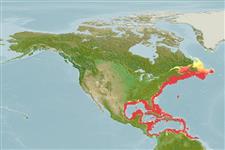分類 / Names
共通名の | 類義語 | Catalog of Fishes(部類, 種) | ITIS | CoL | WoRMS | Cloffa
>
Anguilliformes (Eels and morays) >
Anguillidae (Freshwater eels)
Etymology: Anguilla: Latin, anguilla, .-ae = eel (Ref. 45335); rostrata: Anguilla, Latin for eel, and rostrata, Latin for beaked or curved (presumably a characteristic of which only Lesueur was aware) (Ref. 79012).
More on author: Lesueur.
Environment: milieu / climate zone / depth range / distribution range
生態学
海; 新鮮な水; 汽水性の 底生の; 降流性の (Ref. 26938); 深さの範囲 0 - 464 m (Ref. 57178). Subtropical; 4°C - 25°C (Ref. 12468); 66°N - 5°N, 98°W - 21°W
Northwest to western Central Atlantic: Greenland south along the Atlantic coast of Canada and the USA to Panama, and throughout much of the West Indies south to Trinidad.
Length at first maturity / サイズ / 重さ / 年齢
Maturity: Lm 68.5, range 37 - 100 cm
Max length : 152 cm TL オス/雌雄の選別がない; (Ref. 26938); 122.0 cm TL (female); common length : 50.0 cm TL オス/雌雄の選別がない; (Ref. 3242); 最大公表体重: 7.3 kg (Ref. 4699); 最大記録サイズ: 43 年 (Ref. 40922)
背面の脊椎 (合計): 0; 肛門の骨 0. Head rather long; eyes small and placed well forward on head. Lips thick. Caudal vertebrae without transverse processes. Premaxillae not developed as distinct elements in adults. Frontal bones paired, not grown together. Pectoral girdle with 7 to 9 (up to 11 in the young) radial elements. Adults usually white or light-colored below and brownish to blue-black above, but coloration is variable; young with some yellow on the edges of the dorsal and anal fins (Ref. 30499). Caudal fin rounded, joined to dorsal and anal fins. Gill opening on side in front of lower half of well-developed pectoral fin; lower jaw longer than upper; 103-111 vertebrae (Ref. 26938).
Occurs in streams, rivers, muddy or silt-bottomed lakes (Ref. 5951); usually in permanent streams with continuous flow (Ref. 86798). Hides during the day in undercut banks and in deep pools near logs and boulders (Ref. 86798). Feeds on larvae of Ephemeroptera, Odonata, Plecoptera, Coleoptera, Trichoptera, and Lepidoptera, as well as gastropods, oligochaetes, amphipods, isopods, mysids, and fish from the families Percidae, Cyprinidae, Ictaluridae, Catostomidae and Anguillidae (Ref. 9593). Migrates in autumn to the Sargasso Sea to spawn (Ref. 3242). Sexual maturity occurs approximately in less than10 years and up to 40 years in freshwater (Ref. 57533). Larvae (transparent leptocephali shaped somewhat like a willow leaf) hatch and develop at sea to metamorphose into elvers in nearshore waters and estuaries (Ref. 57533). Adults are caught with eel pots and trot lines. Elvers and glass eels are caught with fine mesh fyke nets and dipnets. Catadromous species. (Ref. 26938). Maximum depth reported taken from Ref. 57178.
Life cycle and mating behavior
成熟 | 繁殖 | 放精 | 卵 | 生産力 | 幼生
Undertakes migration in autumn to the Sargasso Sea where spawning is said to take place. Coloration changes with sexual maturation. Dorsal surface of the pectorals becomes dark, lateral line becomes prominent, eye diameter increases and visual pigments change, body takes on a silvery bronze coloration. Females are usually larger than males and migrate much farther upstream (Ref. 57533). Adults die after spawning (Ref. 30499).
Spawn at sea but growth occurs in estuaries or freshwater (Ref. 7135). Spawning grounds believed to be between 20° and 30°N and 60°and 75°W (Ref. 40916, 40917).
Page, L.M. and B.M. Burr, 1991. A field guide to freshwater fishes of North America north of Mexico. Houghton Mifflin Company, Boston. 432 p. (Ref. 5723)
IUCNのレッドリストの状況は (Ref. 130435)
絶滅危惧 (EN) (A2bd); Date assessed: 08 November 2020
Human uses
水産業: 商業; 水産養殖: 商業; ゲームフィッシュ: はい; 水族館・水槽: 公共の水族館
用具
特記事項
XMLをダウンロードして下さい
インターネットの情報源
Estimates based on models
Preferred temperature (Ref.
123201): 0.5 - 24.3, mean 6.3 °C (based on 323 cells).
Phylogenetic diversity index (Ref.
82804): PD
50 = 0.5000 [Uniqueness, from 0.5 = low to 2.0 = high].
Bayesian length-weight: a=0.00087 (0.00070 - 0.00108), b=3.18 (3.13 - 3.23), in cm total length, based on LWR estimates for this species (Ref.
93245).
栄養段階 (Ref.
69278): 3.8 ±0.2 se; based on diet studies.
回復力 (Ref.
120179): 低い, 4.5年~14年の倍増期間の最小個体群 (tm=3-6; tmax=43; Fec=5,000,000).
Fishing Vulnerability (Ref.
59153): High to very high vulnerability (72 of 100).
Climate Vulnerability (Ref.
125649): High vulnerability (60 of 100).
Nutrients (Ref.
124155): Calcium = 32.2 [19.9, 67.1] mg/100g; Iron = 0.734 [0.430, 1.146] mg/100g; Protein = 19.6 [17.8, 21.5] %; Omega3 = 0.367 [0.197, 0.697] g/100g; Selenium = 56 [29, 105] μg/100g; VitaminA = 8.64 [1.82, 42.50] μg/100g; Zinc = 0.64 [0.46, 0.92] mg/100g (wet weight); based on
nutrient studies.
